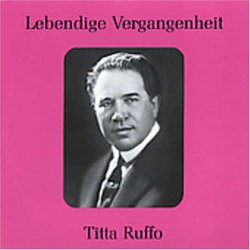| All Artists: Titta Ruffo, Gioachino Rossini, Giuseppe Verdi, Giacomo Meyerbeer, Charles Gounod, Ambroise Thomas, Jules Massenet, Umberto Giordano, Ruggero Leoncavallo, Alberto Franchetti, Enrico Caruso Title: Lebendige Vergangenheit: Titta Ruffo Members Wishing: 0 Total Copies: 0 Label: Preiser Records Release Date: 2/22/2005 Genre: Classical Styles: Opera & Classical Vocal, Historical Periods, Modern, 20th, & 21st Century Number of Discs: 1 SwapaCD Credits: 1 UPC: 717281896078 |
Search - Titta Ruffo, Gioachino Rossini, Giuseppe Verdi :: Lebendige Vergangenheit: Titta Ruffo
 | Titta Ruffo, Gioachino Rossini, Giuseppe Verdi Lebendige Vergangenheit: Titta Ruffo Genre: Classical |
Larger Image |
CD Details |
CD ReviewsThey don't make 'em like that anymore............. Robert C. Hufford | Hopewell, VA USA | 08/14/2008 (5 out of 5 stars) "Cliche, I know, and I used it as the title of my review of Jeritza's disc. But, they really don't. Titta Ruffo [1877-1953] was unique. First, there was his voice, a one-time gift from God, that can be mistaken for no other. A pure force of nature, combined with a technique that was inborn. Then, there were the liberties that singers of that day took with the score. Now, they would be shot, but then, the singer, not the director, decided what would be put up with. That he was a man of honor, none can doubt...when his career was over, he could have cashed-in by accepting a position as professor of voice; he declined, explaining that he really didn't know anything about vocal technique. But..... ...to the issue at hand. As always, fabulous transfers. In a sense, any record this old [1914-1921] is the sonic counterpart of seeing thru a glass darkly, but this disc does a great job of cleaning the glass. You just won't hear singing like this now, for the reasons noted above. Familiar..."The Barber...", "Rigoletto", "Otello", "Ernani", mixed with the rare..."L'Africana" {in Italian}, "Hamlet" {pretty much his signature, also in Italian}, "Thais", to the patently obscure..."Dinorah", "Zaza", "Christoforo Colombo". Alas, only one duet, but WHAT a duet...the classic 1914 "Si, pel ciel", with Caruso. It MAY be the greatest duet, and recording, ever made. May. It is certainly one of the top half dozen. Transfers of it are not rare, but this is by far the best I've ever heard. Maestro Ruffo was simply one-of-a kind. There are lots of great stories, but they belong in a bio, not here. Few records are "essential"...this is. Period. End of discussion." The Lion's Voice Impostazione | New York City Area | 09/23/2006 (5 out of 5 stars) "Titta Ruffo was full of ambition with a tinge of anger/resentment/frustration, and this informs his great singing style. What a great voice this is, great, great voice. It is expressive, ringing, open throated, and surpassingly rich. His voice was a hair less beautiful than Stracciari's, less commanding than Battistini, less agile than de Luca, and less stylish than either Enrico Molinari and Cesare Formichi, and less Verdian in color than Galeffi. He lacked the range of Molinari, which was as phenomenal as his extremely fine Verdi style. However, no one was a bigger star than Ruffo!
The Preiser pressings render the voice natural and one can clearly hear the forcing of tone here and there as if the already big voice wanted to be the biggest and most impressive in the world, and that it was! Brava Ruffo!" |
